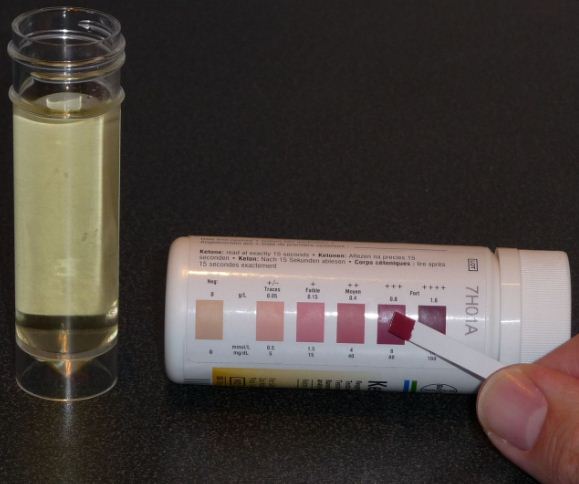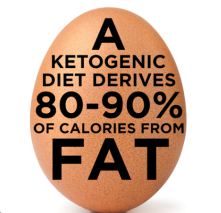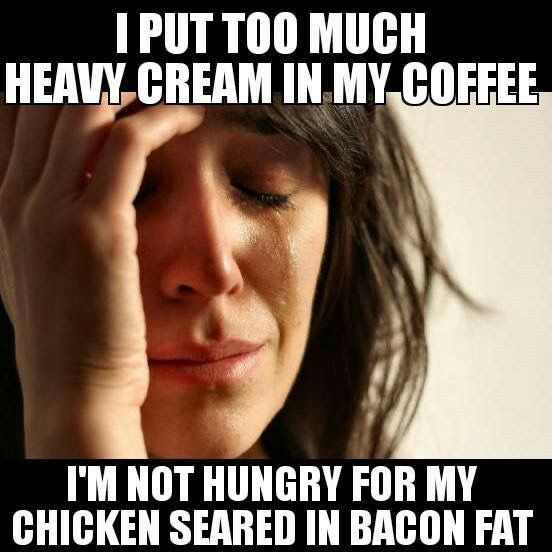Nutrition myths busted! The Ketogenic diet
A reader wrote to ask where in Cuenca he could buy “ketosis strips” to test his urine for ketones since he had decided to “pursue a ketosis diet.” He noted that purchasing a ketone testing machine is much more expensive, so I assume he’s looking to save money.
 Well, I thought, you can try the pharmacy! After all, finding ketones in your blood is a “sick state.” Ketone strips were designed for people with diabetes to test if their blood sugar was dangerously high, a sign of uncontrolled diabetes. Finding that ketones are spilling over into urine signals a medical urgency, to avoid falling into metabolic ketoacidosis. Ketoacidosis is the leading cause of death of people with diabetes who are under 24 years of age. Read more here.
Well, I thought, you can try the pharmacy! After all, finding ketones in your blood is a “sick state.” Ketone strips were designed for people with diabetes to test if their blood sugar was dangerously high, a sign of uncontrolled diabetes. Finding that ketones are spilling over into urine signals a medical urgency, to avoid falling into metabolic ketoacidosis. Ketoacidosis is the leading cause of death of people with diabetes who are under 24 years of age. Read more here.
 While the popular weight loss ketogenic diet is not the same as metabolic ketoacidosis, deliberately eating to promote ketosis is not new either. Developed almost 100 years ago to help treat epileptic children with epilepsy, today, it’s still a useful therapy for this condition.
While the popular weight loss ketogenic diet is not the same as metabolic ketoacidosis, deliberately eating to promote ketosis is not new either. Developed almost 100 years ago to help treat epileptic children with epilepsy, today, it’s still a useful therapy for this condition.
What Is The Ketogenic Diet?
This is a very high fat, low protein and very low carbohydrate diet that forces the body to produce ketone bodies that replace glucose as an energy source. Ditching carbs, and making your body burn fat for fuel makes you feel less hungry, possibly linked to the ketone bodies produced and possible decrease of the hunger hormone, ghrelin. Read more here.
How it works:
 Ketosis is a normal metabolic process that results when your body is starved for glycogen, or stored glucose. Another way to put yourself into ketosis is to fast — or starve. We’ve all experienced how we feel when we haven’t eaten for hours, and we may develop “fruity breath” and have a headache and feel light-headed.
Ketosis is a normal metabolic process that results when your body is starved for glycogen, or stored glucose. Another way to put yourself into ketosis is to fast — or starve. We’ve all experienced how we feel when we haven’t eaten for hours, and we may develop “fruity breath” and have a headache and feel light-headed.
Before I continue, I’ll say that yes, the ketogenic diet can help you lose weight. So can any number of other “diets” that restrict certain foods or food groups. More about that later.
What do you eat?
Mostly fat. And more fat. Lots of fat — up to 80%, even 90% of your calories from fat.
Carbohydrate is severely restricted to only 2-5% of calories. Protein is also very restricted to only 10-15% of calories.
Keto Foods?
 While there is no absolute ketogenic diet (each person’s response to strict carbohydrate is different) one website, the Ketodietblog.com, advises to eat “freely” of fat, saturated fat like lard, beef tallow, chicken fat, duck fat, goose fat, clarified butter/ghee, butter, and coconut oil. This blog recommends eating grass-fed meat, wild-caught fish and seafood, pastured pork, poultry and eggs, gelatin and offal (the internal organs of an animal used as food like heart, kidney, liver, brains.)
While there is no absolute ketogenic diet (each person’s response to strict carbohydrate is different) one website, the Ketodietblog.com, advises to eat “freely” of fat, saturated fat like lard, beef tallow, chicken fat, duck fat, goose fat, clarified butter/ghee, butter, and coconut oil. This blog recommends eating grass-fed meat, wild-caught fish and seafood, pastured pork, poultry and eggs, gelatin and offal (the internal organs of an animal used as food like heart, kidney, liver, brains.)
Carbs are restricted to non-starchy vegetables including leafy greens, some cruciferous veggies, and mostly-water veggies like celery, asparagus, and some squash.
No fruit, except avocado… uniquely high in fat.
How much carbohydrate you can eat depends on your calorie needs. For example:
1500 calories daily x 5% from carbohydrate = 75 calories
 75 calories divided by 4 calories per gram = 18.75 grams – round up to 19 grams
75 calories divided by 4 calories per gram = 18.75 grams – round up to 19 grams
What does 19 grams of carbohydrate look like? Since you’re not eating any fruit, dairy, grains, bread, potatoes or starchy vegetables, it depends on the crunchy vegetables you choose. Keto fans have borrowed from Dr. Robert Atkins’ book, and differentiate between total carbs and “net carbs”, which is carbohydrate minus grams of fiber. So, for example, 1 cup of broccoli contains 6 grams of total carbs and 2.5 grams of fiber. Subtract 2.5 grams of fiber from the 6 total grams of carbohydrate to get approximately 3.5 grams of net carbs.
In order to achieve ketosis, you must be very strict. Some websites even advise avoiding certain brands of toothpaste because they may contain sorbitol or other caloric sweeteners.
Once you’re in ketosis and producing ketone bodies (which you determine by testing your urine with those ketostrips), you can occasionally eat some grain-fed animals, some other high fiber vegetables, nuts, seeds, and some soy. Some sites say full-fat cheese is OK as long as you don’t exceed your carb limit. Others say not.
 Sure, the ketogenic diet can produce weight loss. Even a chocolate diet can produce weight loss. When you adopt a program that strictly requires you to eat only certain foods, and eliminate foods, you will lose weight. That has been shown over and over, ad infinitum. In fact, research shows that the more you “go on” a diet, the more likely you are to remain overweight. Read more here.
Sure, the ketogenic diet can produce weight loss. Even a chocolate diet can produce weight loss. When you adopt a program that strictly requires you to eat only certain foods, and eliminate foods, you will lose weight. That has been shown over and over, ad infinitum. In fact, research shows that the more you “go on” a diet, the more likely you are to remain overweight. Read more here.
Except for children with epilepsy, the ketogenic diet is a fad diet — and it fits the definition like a glove. I’ll quote from Encyclopedia.com.
Fad diets are generally used by consumers to shed a great amount of weight in a short period of time. They are usually based on the erroneous belief that a particular food or food component can cause rapid weight loss or cure a disease. Another tenet of fad diets is that certain foods are harmful and therefore should be avoided completely. Fad diets usually result in short-term weight loss — but most people gain the weight back after discontinuing the diet.
Expect to take supplements: nutritional deficiencies are unavoidable when excluding a whole family of antioxidant vitamins and minerals, not to mention fiber. And consider the environmental impact of a mostly animal fat diet. Read more here.
And speaking of supplements, in my experience, fad diets are also defined by how many products are associated with it — how many “keto diet gurus” have webpages and sell products. You can buy “oral exogenous ketone supplements” like “Keto Bomb” to help get you into ketosis. For only $35.99 you too can enjoy a scoop of powder with a proprietary blend of sunflower oil powder, medium chain triglycerides, saffron extract (bulb) and avocado oil powder. Not to mention artificial flavors, and matodextrin.
According to Environmental Nutrition, People on ketogenic diets can lose weight, at least in the short term, although scientists aren’t entirely sure why. It’s thought that production of ketones may help control hunger or improve the breakdown of fat. But there are risks and side effects involved in losing weight this way. Ketones are meant to be an emergency back-up system for your body, not a long-term energy source. They increase the body’s acidity, which can lead to low blood phosphate levels, decreased brain function, and increased risk for osteoporosis and kidney stones. People on ketogenic diets report higher rates of headaches, bad breath, constipation, diarrhea, general weakness, rash, insomnia, and back pain.
Both Precision Nutrition and Science-Based Medicine have published comprehensive and referenced articles describing the hype and hope of this diet.
PhDs Krista Scott-Dixon and Helen Kollias, in their detailed examination of this diet for Precision Nutrition, write:
… being in ketosis doesn’t seem to have any special advantage for losing body fat (rather than just weight), especially if we consider the lifestyle and behavior aspect to this.
You may find it easy to eat less when all you can eat is protein and fat. But after a while, you may grow tired of bringing your own whole salmon to parties, and wonder what the other 95% of the grocery store is up to. You may start to have fantasies about a threesome: you, Oreos, and chocolate sauce. Not only that, you may be getting some serious scurvy and other nutrient deficiencies.
For women in particular, lowering carbohydrate intake seems to have negative effects.
Women’s bodies go on high alert faster when they sense less energy and fewer nutrients coming in. Many women have found that the low-carb diet that worked great for their husband not only didn’t work for them, but it knocked out their menstrual cycle on the way out the door.
Verdict: We don’t recommend the ketogenic diet for sustainable fat loss.
All diets work …temporarily. Regardless of what diet you “go on” to lose weight, unless you make permanent changes to your lifestyle, if you “go off” your diet and resume your usual diet, you’ll regain the weight, and probably more. Make some smart modifications to your usual diet, and never “go on” a diet again! Read my column to find what’s the best “diet” for permanent weight loss (hint: it’s not someone else’s diet).
Sources:
Diabetes Care. Hyperglycemic Crises in Adult Patients With Diabetes. https://www.ncbi.nlm.nih.gov/pmc/articles/PMC2699725/
Environmental Nutrition. Ketosis Fad Diet Alert. https://www.environmentalnutrition.com/issues/38_9/youshouldknow/Ketosis-Fad-Diet-Alert_152840-1.html
Frontiers in Psychology. Ketosis, ketogenic diet and food intake control: a complex relationship. https://www.ncbi.nlm.nih.gov/pmc/articles/PMC4313585/
Journal of the International Society of Sports Nutrition. Prevalence of micronutrient deficiency in popular diet plans. https://jissn.biomedcentral.com/articles/10.1186/1550-2783-7-24
NYTimes.com. Why You Can’t Lose Weight On A Diet. https://www.nytimes.com/2016/05/08/opinion/sunday/why-you-cant-lose-weight-on-a-diet.html?mcubz=0
PrecisionNutrition.com. The Ketogenic Diet: Does it live up to the hype?
http://www.precisionnutrition.com/ketogenic-diet
Science-Based Medicine. Ketogenic diet does not “beat chemo for almost all cancers.”
https://sciencebasedmedicine.org/ketogenic-diets-for-cancer-hype-versus-science/





















